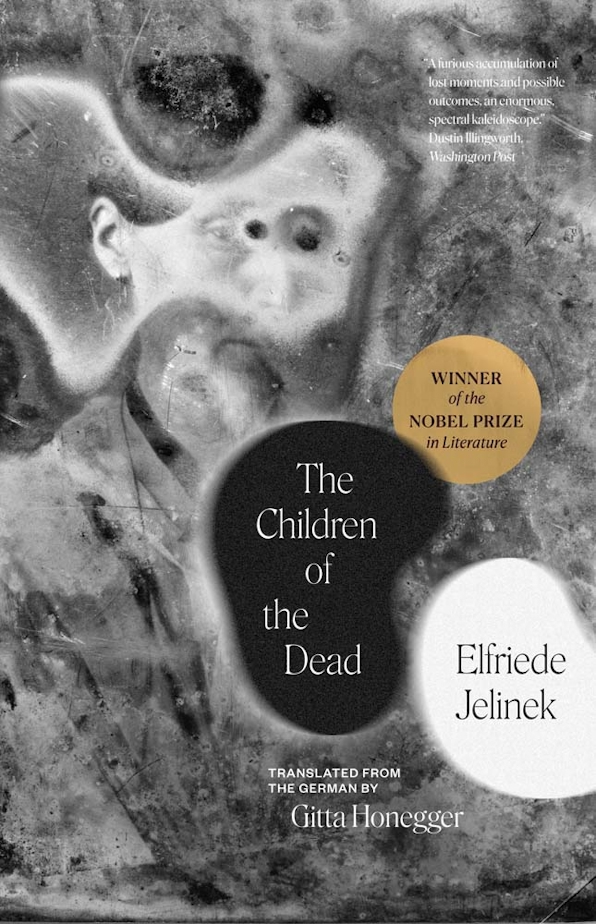
“YOU ARE about to enter the text at hand. It slides through your fingers, but it doesn’t matter, someone else will have to carry me through to completion, a mountain guide, not you!” So Elfriede Jelinek, museless, delivers us unto her slippery magnum opus, The Children of the Dead, published in 1995 and last year made available in English translation, thanks to the Herculean efforts of Gitta Honegger. Winner of the Nobel Prize for Literature in 2004, Jelinek, the exceedingly prolific Austrian author, has written novels, plays for stage and radio, poems, essays, librettos, and more, stalking the shadow sides of humanity to illuminate the sources of its baroque acts of cruelty. At the center of her best-known work, The Piano Teacher (1983), is a woman who, while living at home with her mother, begins a violent, masochistic relationship with a younger man. Another novel, Lust (1989), tells the story of a married woman who cannot tell abuse from love. Yet even the critics who accuse Jelinek of peddling in perversity and the pornographic admit that her prose is as stunningly composed as it is utterly merciless—toward her subjects and readers alike.
The Children of the Dead is a screwball epic, a social satire delectablyfattened with the gristle of a classic horror tale. Jelinek’s specialty: chronicling how human lunacy giveth (comedy) and taketh away (tragedy), sometimes all at once. Her narrator—a version of herself as a kind of Virgil—leads us to an alpine resort filled with simple volk: families, retirees, and other tourists who seem largely moved by their appetites for sausage, gossip, tight clothes, and television. Here in the mountains, they vacate their daily occupations for a brief time to fill their spirits with the sublimity of the Austrian landscape. Little do they know, as they toddle through the verdant forests and up and down the slopes, that buried centuries-deep in the soil beneath their feet are legions of rotting bodies rousing to walk among them again. Jelinek stakes her story to three of the undead, all of whom, she submits, were unremarkable in life. Gudrun Bichler was a middling university student who slit her wrists for failing in an intellectual life she had no capacity for in the first place. (“She won’t be missed in the village of knowledge,” notes the narrator.) Karin Frenzel, who seems to have met her maker in an overturned bus, was a secretary in a sales department and was so generic as to be “a mass product” herself. Finally, Edgar Gstranz, who despite having achieved some notoriety as a B-grade athlete never caught wind of the fact that he was killed in a car accident two years ago. How did his ignorance go unchecked for so long? It’s thanks to good Austrian manners, the narrator explains: “One can’t just blurt out, aren’t you dead, Herr Gstranz, it would be too embarrassing to publicly admit such an obvious error.”
Whether Gudrun, Karin, and Edgar rejected death or death rejected them, it’s impossible to say. “My characters live only insofar as they speak,” Jelinek once remarked, in effect noting life’s two great delimiters: language and mortality. Some of her novel’s ghoulies retain the impulse, if not the wherewithal, to communicate. Gudrun “wants to say something, but the word she is looking for can’t be found anywhere. . . . [She] moves her lips without a sound.” Alas. Like classic movie zombies, they fumble between sleeping and wakefulness, sometimes mawing flesh or shedding limbs, yet they also have a taste for raving, near-ecstatic sex—doing away with the classic antagonisms between Eros and Thanatos. These scenes are master classes in coital choreography—even the Marquis de Sade seems comparatively lacking in craft and imagination regarding the endless holes a body can hack, and hack into—one of them lasting for almost six pages, hardly repeating a single move or metaphor and wiping out any sense of morality or even perversity: “It is the soft flesh, yuk, deep-frozen!, ready-to-eat!, of a woman, that will perish from its own sluggishness, but here we also have a slugger’s balls throwing a jab directly in Gudrun’s chin! Hello! But there are different strokes for different folks.” Who’s to judge what goes on between two consenting corpses?
The Children of the Dead moves like a natural disaster, accruing brutal force across its 480-some pages. As angels of mercy, or agents of evil (hard to tell), Gudrun and Karin and the other undead watch, and possibly bring about, the horrific ends of others, and Jelinek reports on the rising body count in a tone that’s less Cassandra and more carnival barker; life, so short, begins to feel like the ultimate tourist trap, snapping shut on its visitors at any given moment. Jelinek’s story sometimes seems most alive, most vivid, when the gore is at its most extravagant: an elderly married couple commits double suicide by electrifying their iron bed and barbecuing themselves “until the two fatty pieces are grilled in fetid smoke to an indelible crisp”; a twelve-year-old is strangled by another child “with a garotte (self-made with two nails and a piece of rope), thereby cutting halfway through his throat”; a pair of young hunters brain themselves so that their “bone splinters gleam brightly in the sludgy stuff, an eye jiggles like vanilla ice cream on a stick.” On and on churns her bulldozer prose in sentences that seem to stretch for miles, upturning new horrors (and turning our stomachs); her commas signal not pauses but hairpin turns of thought:
Some feces still sticks to the dead young man, it ran down one thigh, the excretions have all dried up by now, but this humpbacked world, this Bucklige Welt (don’t worry, this is actually the name of a beautiful part of lower Austria), this arched manhood, a testament to his last living willy, we are all waiting for it to come, to come up with something more than a name, with life itself that grows on that stem for us to consume, this is how one might imagine it, if poets are to be believed, who sometimes sadly go to pots dumping their verbal torrents all over us, but we had just put our modest mental capital in our savings accounts, so we could later waste it on the hot pins and needles of daytime television, what did I actually want to say?
Jelinek does have a lot to say. Amid the pileups of fatalities and the protracted sessions of feral fucking, she careens readers into myriad subjects from gender politics to the poisons of populism and popular culture. She lets the axe fall on capitalism’s obliteration of selfhood and shows no mercy for the dutifuls who would pretend not to notice that humanity is eating itself if they had the acuity to notice anything at all. How much of contemporary life is bent toward brain death! Jelinek wastes no words, perhaps because language is the one living organism in The Children of the Dead. “You, the good about humans!” she spouts in a rare celebratory burst. “You, the goods!”

“The limits of language are the limits of the world,” Jelinek said in a 2020 interview, an old insight that gets a good dusting by her notoriously dense sentences, all propelled by wordplay, or Wortspiel, so thickly layered with localisms that apparently even native speakers can find it hard to parse what she’s getting at. Her puns pummel the reader, multiplying meanings; lines possess double (or more) of their sense, no need (no room!) to read between them. As Honegger said in a recent interview about Jelinek’s ingeniousness: “Who are we kidding here? It’s untranslatable, basically.” In the spirit of the zombie story, perhaps think of the English-language version of The Children of the Dead as a reanimation of Jelinek’s original instead of mourning whatever’s been lost? Via Honegger, readers can feel the precision of the author’s bite marks in words like “incuntescent,” “carnevalkyrie,” and “incorpsorate,” and surrender to the flurry, as in the following description of a couple of Freedom Party members, men, who meet their fate while out on the mountain for a climb:
Nothing slower than a BMW could get in the way of these hicks, and nothing smaller than an electrified stream spreads out in front of them, outflow from the lake, a packet of cables they flow into, until they are a universally criticized mass. That really gets them going! The more fiercely they get grilled, the deeper they bite into the bridle that was put on them so that the Herr Party-Führer can ride them all the better. They wag and wedel under him, suck up to him, hard stuff drips from the armed pits of newspaper clippings that they paste into scrapbooks. . . . And if anyone dangles, I mean droops, he must immediately be stiffened with blood, so that their heavy fraternal oath holds up real good.
But I’ve buried the lede. Zombies are classically the monstrous projections of the unconscious, archetypes for those horrors that go unspoken, repressed, forgotten. At the book’s core is the memory of Austria’s culpability in the Holocaust. Some of the bodies that return to Jelinek’s resort still bear the marks of the nation’s past: the spots on their flesh, a symptom of having been gassed; the numbers tattooed on their forearms. Born in 1946, Jelinek is Jewish; many of her family members did not survive the war. She belongs to the generation—those children of the dead—who have wrestled with how to conceive of a nation and its culture after genocide, how best to resuscitate and preserve whatever humanity may or may not remain in its citizens. One way is to keep the past present in mind:
Humans become their own memorials so that we, in turn, don’t have to remember them. It is not us who get shoved into and vanish in these memorial ovens, rather a herd of patient humans, who all had to die of suffocation, are shoved out of the ovens; the ventilation has now been actuated, the train of events runs right on schedule, but now the train is running right into us, a messenger of the greeting, that was sent so that I can write something about it fifty years later.
Bodies in fact tend to stay in the ground, but stories return again and again. Words make us and unmake us. We can use them robustly to speak ourselves into existence, or to talk ourselves into realities that are as delicate as the pudding in our skulls, as sticky and elastic as our guts. What better incentives for reading Jelinek, whose words—brimming with life—demand that we stay alert and awake to what’s hurtling past us at an unthinkable speed.“We are just the drafts of the dead,” says Jelinek’s narrator, “and only when we are dead ourselves are we completed and others can get the picture of us.” And only then will the earth reclaim us and allow us all finally to rest.
Jennifer Krasinski is a writer, critic, and frequent contributor to Bookforum.
